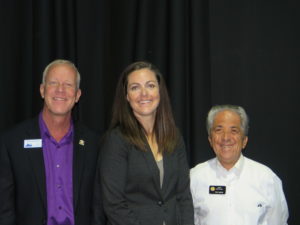Larimer County Sponsors World Elder Abuse Awareness Day
In June, Larimer County Human Services Department sponsored their second annual World Elder Abuse Awareness Day at The Ranch Fairgrounds. The half-day seminar began with an introduction by County Commissioner Steve Johnson followed by HSD Deputy Director Heather O’Hayre and keynote speaker AARP Regional Director Amy Nofziger, with a panel discussion by local professionals with final comments by Colorado State Senator John Kefalas.
Commissioner Johnson thanked the over 150 people in attendance, who were either local retirees, county employees, or professionals working in the different senior industries. He also gave a county proclamation on the World Elder Abuse Awareness Day. Deputy Director O’Hayre gave achievement awards to Deputy Cheryl Davis and Investigator Jacki Hurley with the Larimer County Sheriff’s Office for their work in reducing elder fraud crimes.

Seated l-r: Mary Tigges, Mitch Murray, Lori Metz, Cheryl Davis, Jacki Hurley, Emily Heindel, and Barbara Bennett
The panel included Barbara Bennett, Deputy Cheryl Davis, and Investigator Jacki Hurley with the Larimer County Sheriff’s Office, Emily Heindel and Lori Metz with the Larimer County Adult Protection Office, Mitch Murray with the District Attorney’s Office, and Mary Tigges with the Guaranty Bank.
Keynote speaker Amy Nofziger gave a presentation on senior fraud the three R’s of Consumer Protection: Recognize, Refuse, and Report! She explained to recognize various forms of fraud by recognizing elder problems, scams, vulnerability, and tactics. Overall, $36.4 billion is lost to elder fraud on an annual basis. An estimated 954,000 seniors are skipping medications due to financial abuse. For seniors, this relates to increased depression, isolation from the skipped medications. Ironically, over 1.4 million senior marriages nationally are damaged from the effects of fraud.
Learn to Recognize the various scams! The top five scams are IRS impersonations, computer tech impersonations, sweepstakes or lottery, grandparent scams, and romance scams. Unfortunately, seniors are prone to IRS scams that result in $650,000 in losses per day. Most victims succumb to the tech impersonation scam whereby a scammer ultimately controls the victim’s computer and can retrieve passwords and other important information. Grandparents receive calls from scammers impersonating their grandchildren in trouble needing financial help immediately. Gaining popularity online romance scams, which senior victims are taken for lots of money too.
Nofziger indicated to learn to Refuse these tactics by Just Saying No or hanging up on telephone scammers! She recommended using a refusal script, not to use your personal info on social media pages, use Do Not Call lists to stop scammers and most telemarketers, and most important use an answering machine or voicemail to stop most scams. In other words, if you don’t recognize the phone number or person calling using calling ID, don’t answer your phone! Always ask questions to anyone asking for money and don’t be afraid to say NO!
Be sure to Report any scams, no matter how painful. Otherwise, other seniors will fall prey to the same scams if you don’t report them in your area. Unfortunately, only 1 in 10 victim’s report financial scams due to embarrassment or shame in losing their money.
Most senior don’t know who to report the crimes or potential scams too, but please contact your local district attorney’s office or local law enforcement agencies about these offenses. They have resources to help you. Also, contact the state attorney general’s office or Better Business Bureau’s Scam Tracker website for commercial offenses. In Colorado, please call 1-800-222-4444, which is the elder abuse hotline.
Victims can also report scams to the Federal Trade Commission (FTC) at 1-877-382-4357. FTC recommends never to wire money to collect a prize, or to fictitious relatives demanding money staying in other countries. Always ask questions if a friend or fictitious relative calls you.
The panel explained how some relatives and paid independent caregivers take advantage of disabled or cared for seniors. Be wary of the signs of financial fraud by these people! Scammers use CraigsList to unauthorized renting of homes being sold by professional realtors. Be wary of receiving bad checks over the amount on any items offered on CraigsList as they want you to refund the difference with real money, gift cards, blank checks, or money orders.
Ten FTC methods to avoid a scam are:
1) Spot imposters as they pretend to be government officials, family members, a charity, or a business you’re familiar with.
2) Do online searches for the person calling you. Never agree to do anything during your call, until you check on them online. Or you can also check with the local Better Business Bureau or their website and use their online scam tracker service.
3) Don’t believe your telephone caller ID as most fictitious companies use a false ID associated with the local area code.
4) Don’t pay upfront for any promise. Get their name and phone number and report it ASAP.
5) Consider how you pay! Some credit cards give debt relief for bad purchases, but some don’t. Money services are risky too!
6) Don’t rush to give your money to any caller, but ask many questions and tell them I need to verify your information or until they hang up.
7) Hang up on robocalls. These are prerecorded messages that won’t allow you to interrupt.
8) Be skeptical about free trial offers. Before you agree to any free trial, research their website for validity.
9) Never deposit a check from a caller or wire money back to the caller. It takes banks many weeks to search for fake checks and you are liable for the missing funds.
10) Sign up for free scam alerts at www.ftc.gov/scams.
Many scammers use email to entice victims to purchase their false services. These include travel packages, loans, investment opportunities, charitable causes, foreign lotteries, extended car warranties, free gifts with another purchase, and free trial offers. Be aware of these and other suspicious offers.
State Senator John Kefalas discussed working with the action planning committee on aging in creating new legislation in protecting seniors. More information can be viewed at www.Colorado.gov/agingstrategy. Since 2013, new legislation has helped seniors on fraud protection and reporting methods.
Never give your personal information to anyone on the phone as it will result in ID theft of your personal information and loss of your financial freedom! Bottom line is to be diligent of your personal information and never give strangers access to your computer, financial, or Internet accounts!
Call the Larimer County Office on Aging at 970-498-7750 for help! Thanks to Larimer County Office on Aging Ombudsman staff for hosting this beneficial event!



